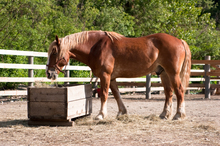The ingredient list is your most important source of information when evaluating a feed or supplement for your horse. Items within the ingredient list must be presented in a certain order.

Assuring better horse nutrition
Ultimately, it is your responsibility to know what is in your horseâs feed. Call the manufacturer for clarification. Don't guess when it comes to your horse's health.
According to the Association of American Feed Control Officials (AAFCO), the ingredient with the highest percentage of total weight must be listed first with all ingredients listed in descending order.
However, under certain conditions, the manufacturer may list ingredients alphabetically, making it difficult to interpret concentrations. Also, feed items are often clumped together in one term.
This is typically the case with added fat. Many manufacturers will list fat content simply as âvegetable oil,â leaving you, the consumer, with absolutely no idea of the source. The only thing this tells you is that the fat is not of animal origin.
But there are many vegetable oils available -- the most commonly added ones are soybean, corn, and coconut oils. The majority of fatty acids in soybean and corn oils are in the omega 6 variety, which is inflammatory in high amounts when not balanced with omega 3s.
Coconut oil does not contain any appreciable omega 3s or 6s, but it is easy to handle because it is solid (due to its highly saturated chemistry); however, research is unclear about whether it is safe for long-term consumption.
Ultimately, it is your responsibility to know what is in your horseâs feed. Call the manufacturer for clarification. Don't guess when it comes to your horse's health.
About Dr. Getty:
Juliet M. Getty, Ph.D. is an independent equine nutritionist with a wide U.S. and international following. Her research-based approach optimizes equine health by aligning physiology and instincts with correct feeding and nutrition practices.
Dr. Gettyâs comprehensive resource book, Feed Your Horse Like a Horse, is available at www.GettyEquineNutrition.com -- buy it there and have it inscribed by the author, or get it at Amazon (www.Amazon.com) or other online retail bookstores. The seven separate volumes in Dr. Gettyâs topic-centered âSpotlight on Equine Nutritionâ series are available with special package pricing at her website, and also at Amazon in print and Kindle versions. Dr. Gettyâs books make ideal gifts for equestrians.
Find a world of useful information for the horseperson at www.GettyEquineNutrition.com: Sign up for Dr. Gettyâs informative, free e-newsletter, Forage for Thought; browse her library of reference articles; search her nutrition forum; and purchase recordings of her educational teleseminars. Reach Dr. Getty directly at gettyequinenutrition@gmail.com. She is available for private consultations and speaking engagements.
by Juliet M. Getty, Ph.D.
